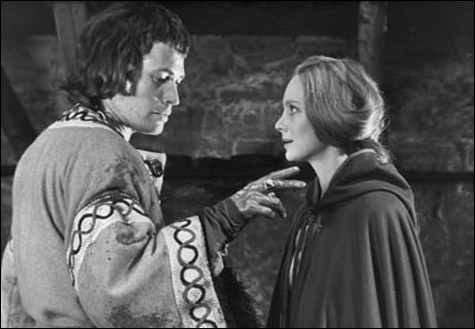 |
Roman Polanski in his 1971 adaptation of Shakespeare’s Scottish play opts for grim, sodden, literal realism, with the Weïrd Sisters as witchy crones and all manner of on-screen rape, slaughter, and execution (including the pre-Macbeth thane of Cawdor). The film came out under the aegis of Playboy Productions (Hugh Hefner executive-produced), so Macbeth’s second meeting with the Sisters turns into a naked-witches’ sabbath, and we’re invited to ogle Francesca Annis’s buttocks during Lady Macbeth’s sleepwalking scene. The faux mediævalism is right out of ’30s Hollywood; Jon Finch as Macbeth and Annis as his wife give studied, stilted readings, often in voiceover, that might have you wondering what Ian McKellen and Judi Dench (to name just two) were doing at the time, and they’re outshone by Martin Shaw’s gruff Banquo and Terence Bayler’s Sean Connery–like Macduff. The Hecate scenes (doubtless by Thomas Middleton) are cut; so is the mystifying act four paltering between Malcolm and Macduff. But the palpable dagger to the Bard’s mind (and to the play’s real subject, time) is Polanski’s cynicism, with Ross an improbable and sadistic turncoat who murders Lady Macduff and Donalbain finishing it off by visiting the Sisters to learn whether he’s fated to overthrow his brother.